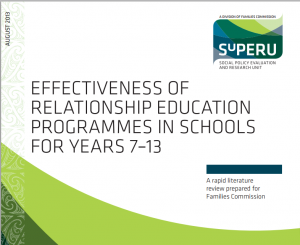
A rapid literature review prepared for the Families Commission by the Social Policy Evaluation and Research Unit.
This paper looks at the New Zealand education context, what works in school-based relationship education, the common characteristics and practices of effective school-based relationship education, New Zealand approaches and programmes and what works for Māori and Pacific students.
“This report contains some clear pointers for the Government and for schools about developing and implementing relationship education programmes. For example, programmes should be integrated into the curriculum, use active teaching methods, be culturally appropriate and be taught by skilled and trained educators. There are also some clear lessons about what not to do. It is hoped that this report will contribute to emerging good practice in relationship education in New Zealand.” P12
Some key learnings include:
- Safe Dates and The Fourth R are the programmes most widely agreed to be effective. P10
- comprehensive programmes with a strong focus on relationship aspects may be more effective than others for achieving sexual health outcomes. P10
- there are still fundamental gaps in knowledge about what works in relationship education. P10
- programmes need to be sensitive to diversity, and tailored to ensure that content is relevant and culturally appropriate for the target group. P10
- violence prevention programmes such as Love Bites and BodySafe have been well received, with evidence of knowledge gains and changes in behavioural intention immediately post-intervention. However, their long-term impact on knowledge, behaviour and attitudes has not been tested. P11
- there is strong evidence from robust studies that school-wide efforts to improve relationships, behaviour and school culture can be very successful, particularly when grounded in Māori relational concepts and practices. P11
- there is considerable evidence that sexuality education in New Zealand is poorly implemented in many schools, and does not meet the learning needs of students. P11
- some generic programmes such as BodySafe, Kiwi Can and Cool Schools are intended to be appropriate for a wide range of students, including Māori and Pacific, and evaluations give promising results. P12
Find the report here.
